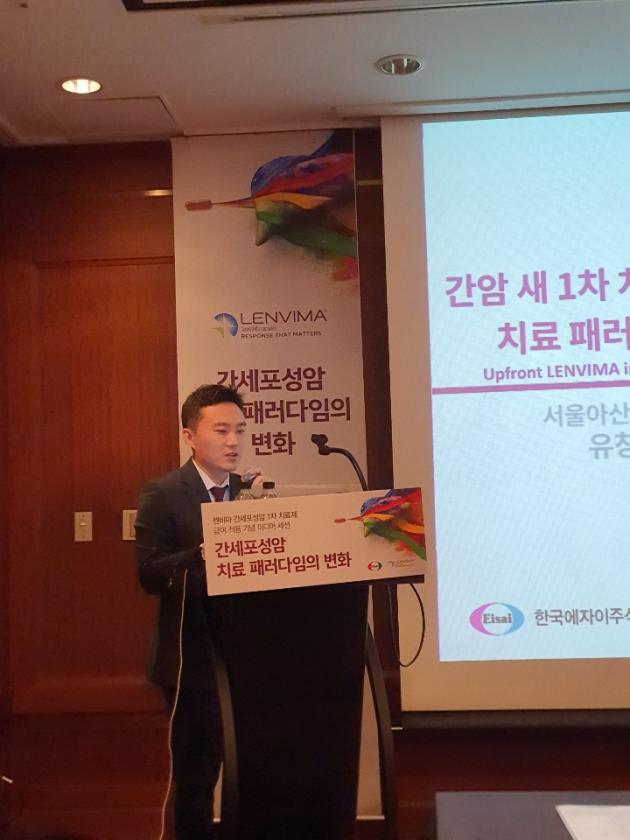Eisai's Lenvima, a hepatocellular carcinoma treatment, has managed to show improved response rate and overall survival when compared to Bayer's Nexavar, Eisai Korea said Wednesday.

The treatment has recently gained insurance benefits from the Ministry of Food and Drug Safety as a first-line treatment for unresectable advanced hepatocellular carcinoma.
The ministry approved the drug after the company proved the treatment’s improved treatment effects, such as progression-free survival, compared to Nexavar in a large-scale phase 3 clinical trial REFLECT study.
"The five-year relative survival rate of liver cancer is about 35 percent, which is about half of the total cancer survival rate," said Professor Yoo Chang-hoon at Asan Medical Center said in a news conference Wednesday. "Also, more than half of the diagnoses are made after stage 3."
To continue the treatment of hepatocellular carcinoma, it is essential to select a treatment that considers not only the effect but also patients’ quality of life, Yoo added.
In this regard, Yoo stressed that Lenvima successfully showed increased overall survival, progression-free survival, duration of disease progression, and objective response rates when compared to Nexavar in the REFLECT study.
"The trial results showed that Lenvima was not inferior to Nexavar in overall survival (13.6 months vs. 12.3 months)," Yoo said. The objective response rate also more than doubled (24.1 percent vs. 9.2 percent), while the independent modified response evaluation criteria in solid tumors saw the response rate of Lenvima as 41 percent."
Lenvima's response rate is the highest among all liver cancer treatments yet, he added.
Higher response rates also raised tumor size reduction rates.
"The study found that one out of four Lenivima-treated patients and one in 10 Nexavar-treated patients had tumor reductions of more than 30 percent," Yoo said. "Progression-free survival was 7.4 months versus 3.7 months, and disease progression was 8.9 months versus 3.7 months, respectively."
Professor Kim Seung-up at Severance Hospital also stressed Lenvima is an alternative treatment option for hepatocellular carcinoma patients.
"Recently, the sub-analysis correcting liver cancer tumor markers of REFLECT patients showed that the overall survival of Lenvima was significantly improved compared to Nexavar," Kim said. "Liver cancer tumor markers are known to affect the overall survival of hepatocellular carcinoma patients adversely."
Lenvima also showed a relatively slow deterioration rate in pain, diarrhea, nutrition, and body image, resulting in an improvement in the quality of life in addition to prolonging survival, he added.
On the other hand, Professor Kim also stressed that Korea needs to expand the range of drugs from which patients can choose.
"While Lenvima recently received insurance benefits as a first-line treatment for hepatocellular carcinoma patients, if Lenvima is not effective, patients have to change to Nexavar, which they will have to pay the whole amount with no insurance benefits," Kim said. "This greatly increases the financial burden for patients."
Therefore, the government has to come up with a new plan so that patients can safely change drugs without being overburdened by financial reasons, he added.

